| Srl | Item |
| 1 |
ID:
184172
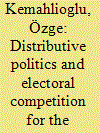

|
|
|
|
|
| Summary/Abstract |
Competition for the Kurdish vote has been important in contemporary Turkish politics. Focusing on the non-contributory health insurance program in the early period of AKP rule, this article shows that this competition also affected the distribution of benefits. Kurdish citizens’ likelihood of holding a Green Card increased with the competitiveness of the district between the AKP and Kurdish-oriented parties. The number of Green Cards and social spending were also higher when a Kurdish-oriented party posed an electoral challenge. These findings reveal the electoral calculation behind AKP’s strategy of favoring Kurdish voters as well as the importance of political organization for the minority group’s access to benefits.
|
|
|
|
|
|
|
|
|
|
|
|
|
|
|
|
| 2 |
ID:
167977
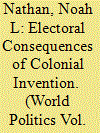

|
|
|
|
|
| Summary/Abstract |
This article studies the effects of traditional chiefs—a common type of broker—on voters’ ability to extract state resources from politicians. Using original data from Northern Ghana, the author shows that chieftaincy positions invented by colonial authorities are especially prone to capture, leaving voters worse off compared both to more accountable chiefs whose authority dates to the precolonial period and to voters who lack formal chiefs who can serve as brokers. The latter comparison exploits exogenous assignment of ethnic groups to the colonial invention of chieftaincy in the late nineteenth century. The findings suggest that whether voters benefit from brokers amidst clientelistic electoral competition depends on the accountability relationship between brokers and their clients.
|
|
|
|
|
|
|
|
|
|
|
|
|
|
|
|
| 3 |
ID:
161402
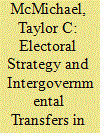

|
|
|
|
|
| Summary/Abstract |
Japanese distributive politics draws scholarly attention as a partial but powerful explanation of the LDP’s electoral dominance via the contention that the LDP rewarded its supporters and punished its opponents. But the empirical evidence disappears when intergovernmental transfers, which can be tracked to electoral constituencies, are examined. Using intergovernmental transfer data, this article tests four separate hypotheses.
|
|
|
|
|
|
|
|
|
|
|
|
|
|
|
|
| 4 |
ID:
176491


|
|
|
|
|
| Summary/Abstract |
Does a leader's ethnicity affect the regional distribution of basic services such as education in Africa? Several influential studies have argued in the affirmative, by using educational attainment levels to show that children who share the ethnicity of the president during their school-aged years have higher attainment than their peers. In this paper we revisit this empirical evidence and show that it rests on problematic assumptions. Some models commonly used to test for favouritism do not take adequate account of educational convergence and once this is properly accounted for the results are found to be unstable. Using Kenya as a test case, we argue that there is no conclusive evidence of ethnic favouritism in primary or secondary education, but rather a process of educational convergence among the country's larger ethnic groups. This evidence matters, as it shapes how we understand the ethnic calculus of politicians.
|
|
|
|
|
|
|
|
|
|
|
|
|
|
|
|
| 5 |
ID:
185604
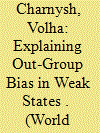

|
|
|
|
|
| Summary/Abstract |
Two dominant explanations for ethnic bias in distributional outcomes are electoral incentives and out-group prejudice. This article proposes a novel and complementary explanation for the phenomenon: variation in legibility across ethnic groups. The author argues that states will allocate fewer resources to groups from which they cannot gather accurate information or collect taxes. The argument is supported by original data on state aid from the 1891/1892 famine in the Russian Empire. Qualitative and quantitative analyses show that districts with a larger Muslim population experienced higher famine mortality and received less generous public assistance. The Muslims, historically ruled via religious intermediaries, were less legible to state officials and generated lower fiscal revenues. State officials could not count on the repayment of food loans or collect tax arrears from Muslim communes, so they were more likely to withhold aid. State relief did not vary with the presence of other minorities that were more legible and generated more revenue.
|
|
|
|
|
|
|
|
|
|
|
|
|
|
|
|
| 6 |
ID:
160634
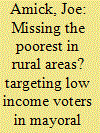

|
|
|
|
|
| Summary/Abstract |
This article utilizes an original household survey of two regency-level elections in Indonesia to explore campaign targeting. It uses a list experiment to show that direct survey questions about accepting transfers from campaigns elicit honest responses from respondents in Indonesia. Although the relationship between income and whether a respondent accepted transfers from political campaigns decreases over the entire distribution of income, it increases initially, producing a curvilinear relationship between income and accepting transfers from campaigns. This article argues that the poorest voters face barriers to being targeted by campaigns. However, these barriers recede as they become relatively richer, at which point a negative relationship is found due to diminishing marginal utility of accepting these transfers. Finally, in-kind transfers, as opposed to cash transfers, target low-income voters more effectively.
|
|
|
|
|
|
|
|
|
|
|
|
|
|
|
|
| 7 |
ID:
186564
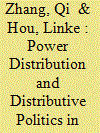

|
|
|
|
|
| Summary/Abstract |
Land fiscalization in China is a local development strategy intended to tilt the distribution of interests disproportionately toward local officials. We propose that the degree of power concentration among provincial Chinese leaders affects their need for support from lower-level bureaucrats. The more that power is dispersed among provincial leaders, the more they are incentivized to dispense benefits to local officials. To test this hypothesis, we used provincial-year panel data spanning 2003–2012 to examine how power concentration among provincial leaders affected land fiscalization within their jurisdictions. The empirical results robustly supported the hypothesis.
|
|
|
|
|
|
|
|
|
|
|
|
|
|
|
|
| 8 |
ID:
180197
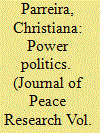

|
|
|
|
|
| Summary/Abstract |
Scholars observe that armed non-state actors (NSAs) often provide social services to reinforce their popular support and legitimacy as guarantors of local order. On the other hand, NSAs usually face funding constraints that make the independent provision of distributive goods difficult. This article argues that armed NSAs employ an alternative, more cost-effective tactic to deliver services. It argues that militant groups can leverage their armed capacity to capture control of and monopolize access to state-sponsored services. As an example, it documents the capture of public electricity infrastructure that took place in post-invasion Baghdad under the Sadrist Movement, an armed group formed shortly after the ouster of the Ba’athist state. Using local-level information about the location of Sadrist offices and remote sensing data, it estimates that Sadrist-affiliated neighborhoods in Baghdad saw an average increase in access to electricity between 2003 and 2006 that was significantly greater than in other areas of the city. The article concludes by addressing threats to inference, showing that these differences are not alternatively explained by demographic differences or changes therein due to ongoing conflict. It also discusses how this NSA strategy might contribute to an equilibrium of low state legitimacy and weak capacity in fragile contexts like that of post-2003 Iraq.
|
|
|
|
|
|
|
|
|
|
|
|
|
|
|
|
| 9 |
ID:
182592
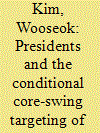

|
|
|
|
|
| Summary/Abstract |
In this article, I present a theory of conditional core-swing targeting that focuses on the competition for majority control in legislative elections to explain how presidents use their strong budgetary powers to manipulate the distribution of the national subsidy in South Korea. Presidents whose parties already possess a legislative majority are expected to favor core municipalities to strengthen the foundations of their majority constituency, whereas those who seek majority control are predicted to prioritize swing municipalities in an effort to cross the majority threshold. Presidents are also anticipated to respond to the electoral cycle by shifting subsidies to riskier municipalities when elections approach. Using a novel data set on national subsidy allocations that spans three decades, I find evidence in favor of the hypotheses. This article demonstrates that the beneficiaries of distributive favoritism are not fixed, and that politicians can engage in complex and varied targeting strategies to achieve their objectives.
|
|
|
|
|
|
|
|
|
|
|
|
|
|
|
|
| 10 |
ID:
121600
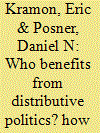

|
|
|
|
|
| Publication |
2013.
|
| Summary/Abstract |
Papers in the burgeoning empirical literature on distributive politics often focus their analysis on the pattern of distribution of a single patronage good-for example, cash transfers, roads, education spending, electrification, or targeted grants. Yet because governments can favor constituencies through the targeting of multiple public and private goods, drawing general conclusions about distributive politics by investigating just one (or even a few) good(s) can be misleading. We demonstrate the severity of this problem by investigating a particular manifestation of distributive politics-ethnic favoritism-in a particular setting-Africa-and show that the conclusions one draws about who benefits from government allocation decisions can vary markedly depending on the outcome one happens to study. Our findings suggest the need for caution in making general claims about who benefits from distributive politics and raise questions about extant theoretical conclusions that are based on empirical work that focuses on a single distributive outcome. The findings also provide a foundation for a new research agenda aimed at identifying the reasons why political leaders choose to favor their supporters with some public and private goods rather than others.
|
|
|
|
|
|
|
|
|
|
|
|
|
|
|
|